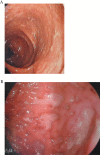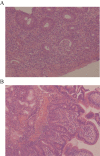Cancer Immunotherapy with Anti-CTLA-4 Monoclonal Antibodies Induces an Inflammatory Bowel Disease
- PMID: 26783344
- PMCID: PMC4946758
- DOI: 10.1093/ecco-jcc/jjv227
Cancer Immunotherapy with Anti-CTLA-4 Monoclonal Antibodies Induces an Inflammatory Bowel Disease
Abstract
Background: Therapeutic monoclonal anti-cytotoxic T-lymphocyte-associated antigen 4 (CTLA-4) antibodies are associated with immune-mediated enterocolitis. The aim of this study was to provide a detailed description of this entity.
Methods: We included patients with endoscopic signs of inflammation after anti-CTLA-4 infusions for cancer treatment. Other causes of enterocolitis were excluded. Clinical, biological and endoscopic data were recorded. A single pathologist reviewed endoscopic biopsies and colectomy specimens from 27 patients. Patients with and without enterocolitis after ipilimumab-treated melanoma were compared, to identify clinical factors associated with enterocolitis.
Results: Thirty-nine patients with anti-CTLA-4 enterocolitis were included (ipilimumab n = 37; tremelimumab n = 2). The most frequent symptom was diarrhoea. Ten patients had extra-intestinal manifestations. Most colonoscopies showed ulcerations involving the rectum and sigmoid, 66% of patients had extensive colitis, 55% had patchy distribution and 20% had ileal inflammation. Endoscopic colonic biopsies showed acute colitis in most patients, while half of the patients had chronic duodenitis. Thirty-five patients received steroids that led to complete clinical remission in 13 patients (37%). Twelve patients required infliximab, of whom 10 (83%) responded. Six patients underwent colectomy (perforation n = 5; toxic megacolon n = 1); one of them died postoperatively. Four patients had a persistent enterocolitis at follow-up colonoscopy. Patients with enterocolitis were more frequently prescribed NSAIDs compared with patients without enterocolitis (31 vs 5%, p = 0.003).
Conclusions: Ipilimumab and tremelimumab may induce a severe and extensive form of inflammatory bowel disease. Rapid escalation to infliximab should be advocated in patients who do not respond to steroids. Patients treated with anti-CTLA-4 should be advised to avoid NSAIDs.
Keywords: Anti-CTLA-4; enterocolitis; ipilimumab.
Copyright © 2016 European Crohn’s and Colitis Organisation (ECCO). Published by Oxford University Press. All rights reserved. For permissions, please email: journals.permissions@oup.com.
Figures



References
-
- Freeman GJ, Gribben JG, Boussiotis VA, et al. Cloning of B7-2: a CTLA-4 counter-receptor that costimulates human T cell proliferation. Science 1993;262:909–11. - PubMed
-
- Azuma M, Ito D, Yagita H, et al. B70 antigen is a second ligand for CTLA-4 and CD28. Nature 1993;366:76–9. - PubMed
-
- McCoy KD, Le Gros G. The role of CTLA-4 in the regulation of T cell immune responses. Immunol Cell Biol 1999;77:1–10 - PubMed
-
- Sansom DM, Walker LS. The role of CD28 and cytotoxic T-lymphocyte antigen-4 (CTLA-4) in regulatory T-cell biology. Immunol Rev 2006;212:131–48. - PubMed
MeSH terms
Substances
LinkOut - more resources
Full Text Sources
Other Literature Sources
Medical

